At Fenway Park two nights ago my wife, Jill, looking at lanky Red Sox ace Chris Sale wondered “Where does the expression ‘long drink of water’ [for a tall, thin person] come from?”

She was asking the right person, of course, and today I set out to find the answer.
I thought the expression might be “tall drink of water” or “tall glass of water” and, indeed, those are also widely used, though “long drink of water” is most common. (See this Google Books Ngram graph; Newspapers.com give similar results.)
But when and from where did it originate?
The OED, which defines the term as “a tall, slim, long-limbed person,” cites the earliest use as occurring in 1913.

Wiktionary says “The term originated in the United States, and was presumably used in vaudeville performances,” adding that “It was derived from earlier Scots lang drink.”
There was a long discussion of the term on the English Language & Usage site on the Stack Exchange platform in 2015. One contributor found an 1887 use of the Scots lang drink with the same meaning cited in the Dictionary of the Scots Language, though the citation doesn’t include the “of water” part of the phrase.

The earliest example with “of water” in the Scots dictionary is from 1931, but I found one — and a delightful one at that — from a short story in a newspaper in the town of John o’ Groat in the far north of Scotland in 1888:
I’m sure I dinna ken’ what she sees to admire in yon great big ostrich-neckit lang drink o’ water, wha only needs to be weel steepit in tar to mak’ a first-rate telegraph pole.
John Mackey. “Jessie’s Dream, or In Love with the Minister.” John o’ Groat Journal, November 21, 1888, p3
That is the earliest use of the full term I’ve found, and matches Wiktionary’s tracing the origin to the Scots Language. But what about its use in American English, which is where OED says it originated?
Another Stack Exchange contributor found a 1904 use of “long drink of water” in a South Dakota newspaper article about a theater production. A child actor in the play was described as “not much larger than a long drink of water.” (“Makes a Big Hit.” Daily Huronite (Huron, SD), May 7, 1904, p3.) But, as the contributor points out, that is more of a direct comparison and not really a use of the phrase as a metaphor. (The earliest metaphorical use that person found was from 1924. )
I found a 1906 review of the musical comedy Peggy From Paris by George Ade that has one of the characters spouting several colorful slang expressions, including “Say, dat dame is as thin as a long drink of water.” Ade, the playwright, according to the article “is conceded to be the father of modern slang, and his inventions along that line are pleasing.” (“Tough Man Has Good Slang.” Evening News (San Jose, CA), November 7, 1906, p5).
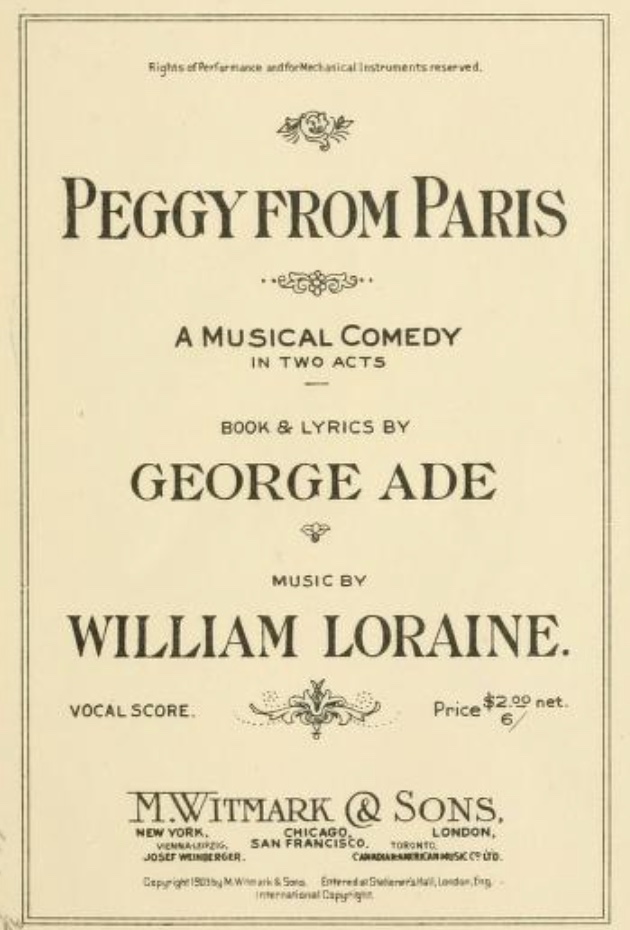
The play, which was published in 1903, appears to consist entirely of musical numbers, and none of the lyrics contain the phrase “a long drink of water” or anything like it. It may have been an aside that was part of the play but did not appear in the published version. The playwright, Ade, who was also a newspaper columnist, a screenwriter, and an author of essays and short stories, was well known for his use of street language, slang, and vernacular vocabulary.
There are a couple of other early uses worth noting. The first is the use of the term in three different columns by Joseph A. Flynn, a New York Evening World columnist who shared whimsical stories under the title “At the Boarding-House” or “Boarding-House Fables”. In the first of these, accompanied by an illustration, he described a woman named Henrietta and her companion this way: “….who should be standing on the sidewalk but her, with a long drink of water beside her, in a blue serge suite.”
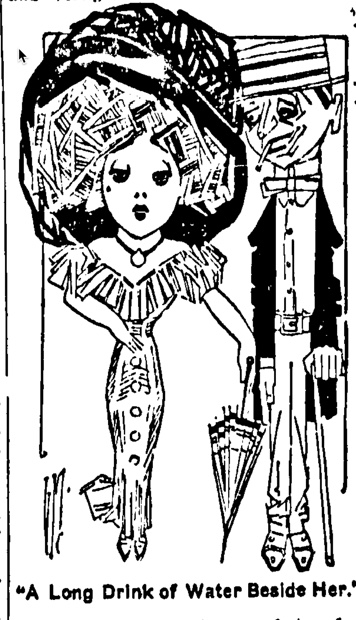
Finally, one more American example from the first decade of the 20th century. Like the 1888 example from Scotland, it’s from a piece of fiction in a newspaper. It also takes us back to where we began: to a lanky pitcher on the mound in a major league baseball game. It’s in what what seems to be a fictional story about a window washer named Bob Kelly who spends a night hanging from the ledge of a New York skyscraper after the window he’s washing accidentally slams shut and can’t be opened from the outside.
While waiting early the next morning for someone to arrive and let him back in he thinks about many things, including that day’s Giants-Cubs game at the Polo Grounds with the Giants’ Christy Mathewson on the mound.
[W]ould Kelly be there, rooting like a fiend in his bleacher seat and pulling for that ‘long glass of water’ as he called ‘Matty’? You know it!”
“The Window Washer.” Wausau (WI) Daily Record-Herald, December 23, 1909, p6

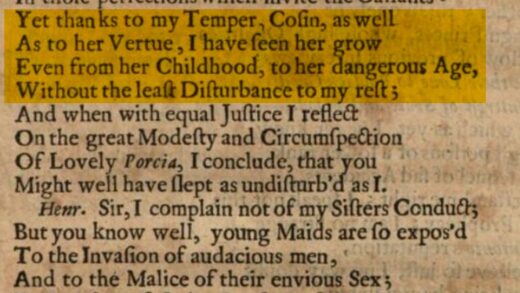
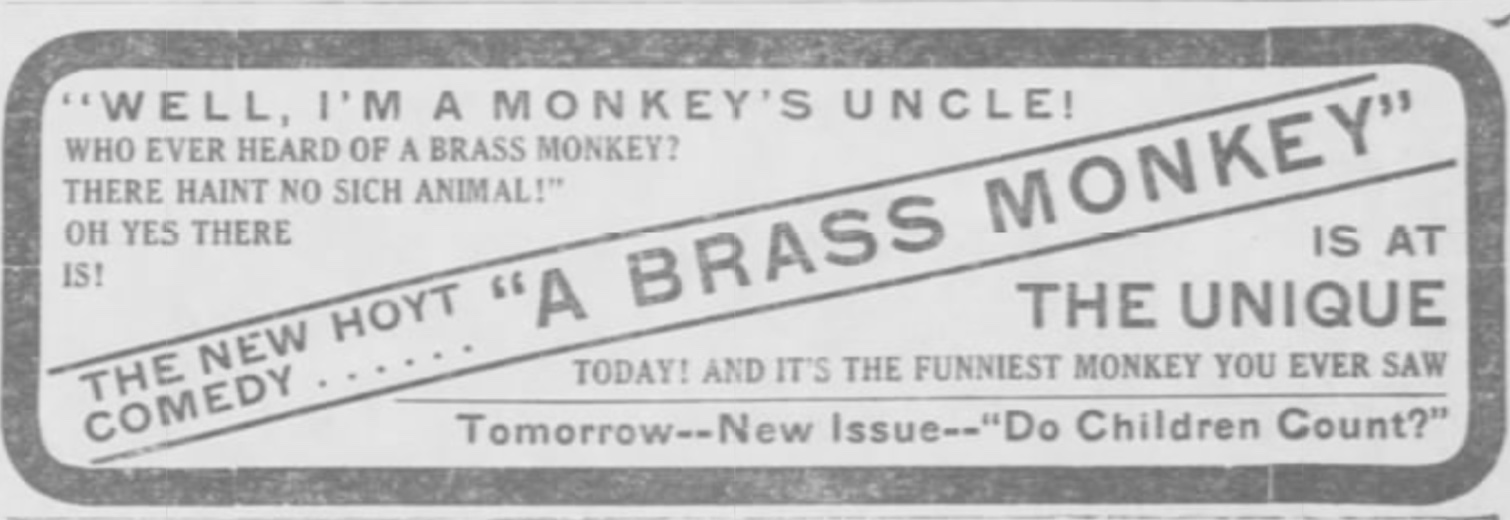
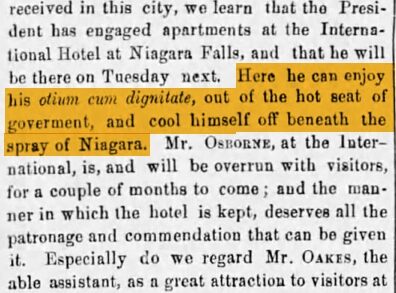
Excellent stuff! Keep going, Ken! 🙂